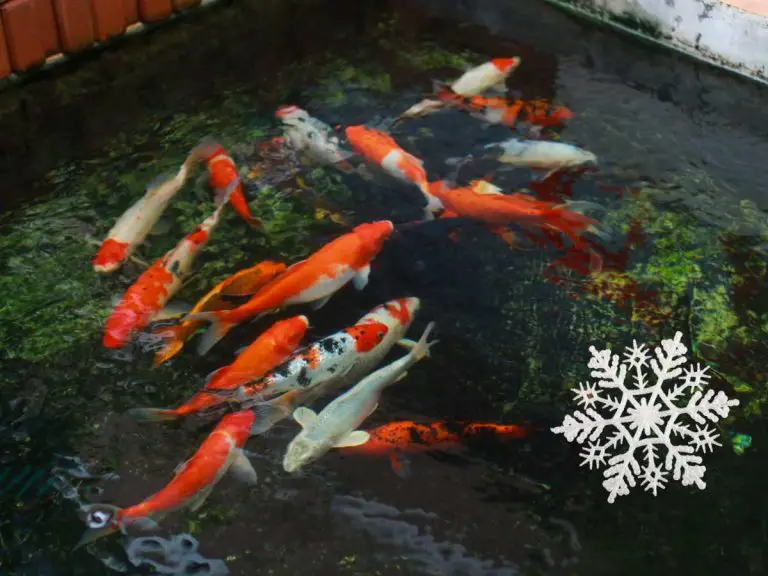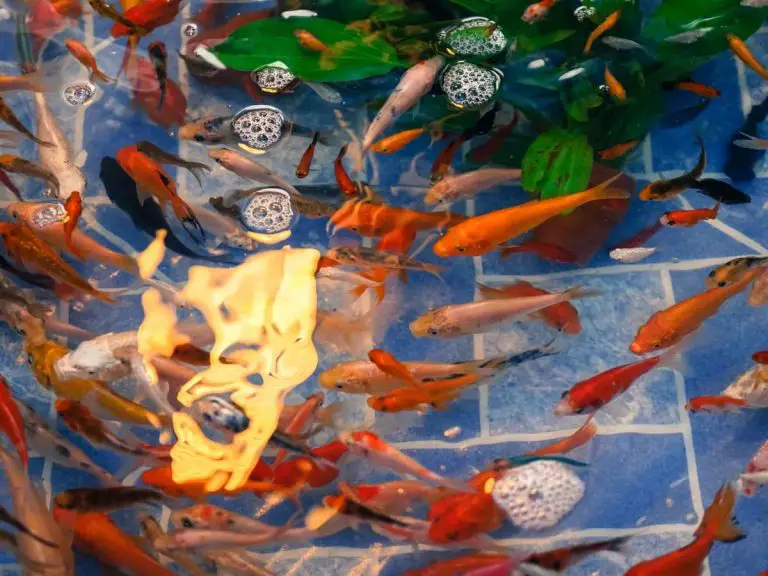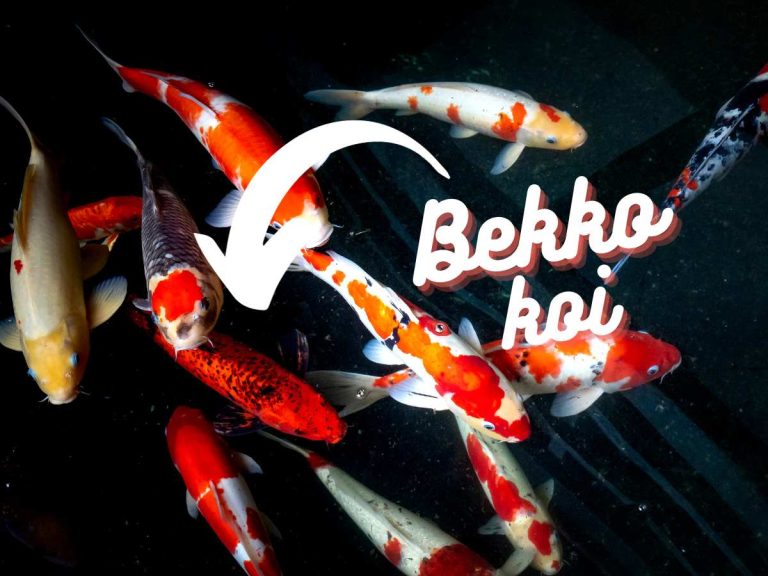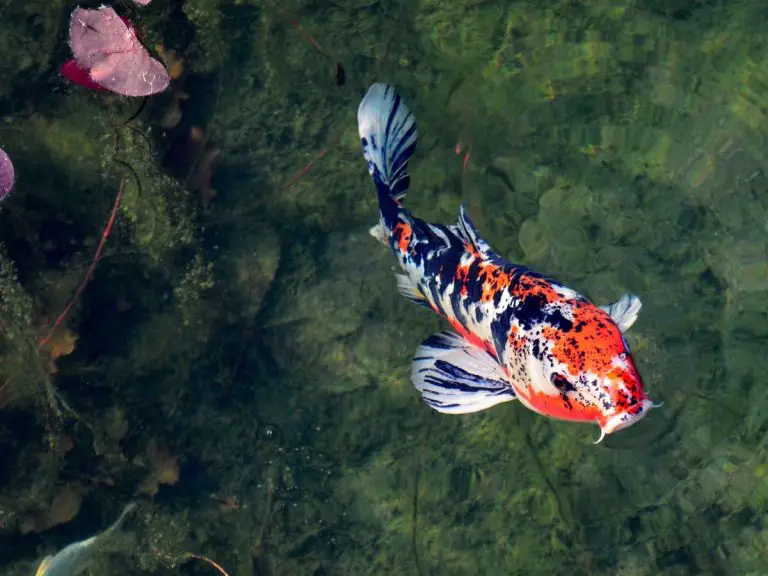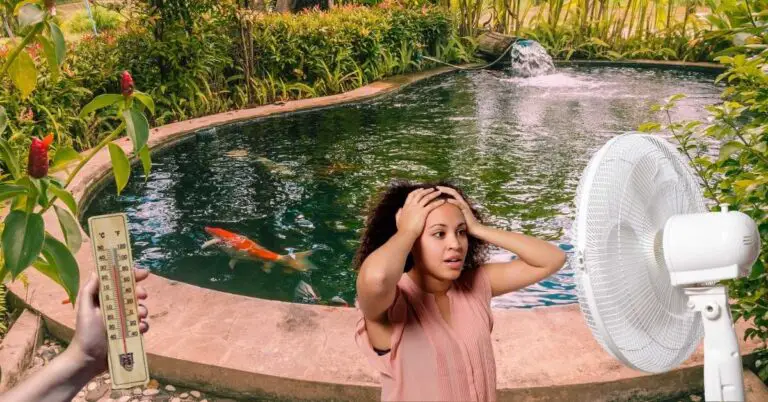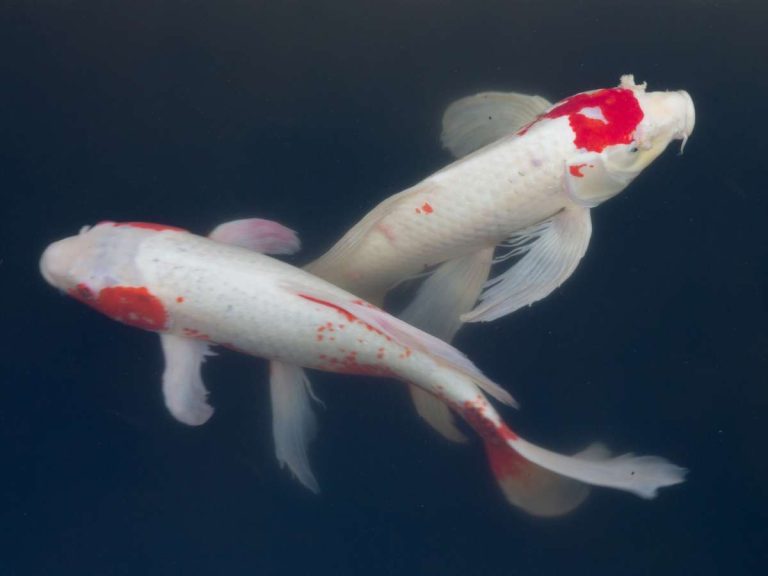Do Koi Fish Have Teeth? Here’s What Happens If One Bites You
You probably feed your koi fish large solid pellets – food that you would have to chew with your teeth if so inclined. So have you ever wondered if koi chew their food, too? In other words, do koi fish have teeth?
Koi fish have very small teeth in the back of their throat. Their teeth are not much bigger than a tic tac, and they are so far back in their throat that you will likely never see them – although if you listen carefully, you can hear them using their teeth to grind their food. You do not need to worry about koi fish biting you or hurting you with their teeth.
Don’t let that gummy mouth fool you. Koi fish teeth are quite fascinating. Keep reading to learn why.
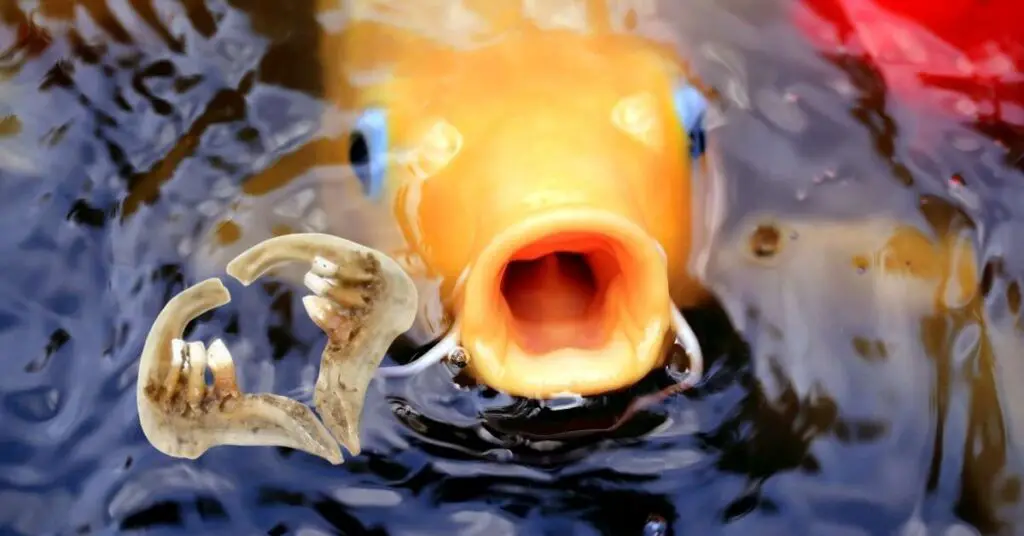
Did you know that many premium Koi breeders sell online and ship directly to your home? This is a great option for those who don’t have a local Koi breeder to buy from, but only if you pick a reputable seller. For more information, check out my guide on where to buy Koi online.
Koi Fish Teeth
Koi fish have what are called pharyngeal teeth, which are common in many freshwater fish and sucker fish, as well as in carp and goldfish. This means their teeth are on the pharyngeal arch, which is at the back of their throat. Koi fish teeth are bony projections that grow from this arch, pointing inward and upward, making them a bit different than human teeth.
Koi fish only use their teeth to grind their food. They don’t use them either defensively or aggressively (except sometimes during mating, which we’ll cover below). In other words, you don’t need to worry about them chomping down on your fingers!
In fact, for adult koi fish, their teeth are so far back in their throat that they couldn’t bite down on your finger if they tried.
But as you can see below, koi fish are typically quite docile and will actually eat right out of your hand – and you don’t have to worry about losing any fingers!
Related Post: How to Care for Koi Fish
How Koi Use Their Teeth
You may have noticed that your koi fish will try to eat just about anything. These are bottom feeder fish, and they’ll suck up – and then often spit out – that’s not tied down.
Anything that a koi fish can’t digest they either spit out or expel through their gills.
And anything that they can eat will get pushed back of their throat, where their teeth will grind it up before it makes it to their digestive track.
Note that koi fish only have teeth on the bottom of their jaw. They grind these teeth into a tough cartilage pad called a ‘Carp stone’ at the base of their skull. Very strong jaw muscles power this chewing.
Koi fish teeth are only used for this purpose of grinding their food. And since they don’t eat human fingers, you don’t need to worry about them.
But like I mentioned, koi fish are a bit like human babies – they’ll put anything in their mouths. If your finger is too close, they might mistake it for food and try it out. Their gums are pretty strong, but this ‘bite’ shouldn’t be painful (although it might tickle a little). And they’ll let your finger go as soon as they realize they can’t eat it. Think of it like a little love bite.
Finally, while carp such as koi use their teeth primarily for grinding their food and are not a threat to humans, they can bite other fish which can lead to issues. One study found that koi will bite fancy goldfish, which can create tears in their skin that can lead to disease. Male koi fish may also become aggressive during mating season and bite female koi fish, which again can lead to potentially worrisome skin tears.
That said, koi fish are generally not aggressive fish, and they don’t hunt other fish (although they will eat baby fish, tadpoles and insects).
Koi Teeth Health
Don’t worry if you find teeth at the bottom of your pond or in your filter. This is quite normal, and many people report finding more teeth in the summertime.
As you can see in the following video, koi fish are on the smaller side. But koi fish can still cost the tooth fairy a pretty penny, because they lose their teeth quite frequently, going through up to 30 sets of teeth (or more) throughout their lives.
Koi can have up to three rows of teeth, and it’s totally fine healthy if they lose their teeth – in fact, you should expect this. If you notice your koi shaking a bit at the bottom of your pond, followed by 2-3 days where they’re not eating, it could be because they are shedding their teeth.
Your fish should only shed teeth that are no longer healthy, so this is a good sign! During this process, they may not eat, or they may eat softer food that they find at the bottom of your pond.
Koi teeth tend to make their way to your pond filter, although you can also find them at the bottom of your pond. They’re not generally a problem, but if you have lots of koi and therefore lots of teeth, you might want to remove them to avoid clogging your filter or tears in your liner or other minor damage.
So, have you been holding back on hand feeding your koi because you’re a little bit afraid of their mouths? Hopefully now you understand that koi fish teeth are not something to fear. In fact, hand feeding tame koi fish can be one of the greatest pleasures of your backyard pond.
Related Questions:
Do Koi Have Teeth?
Koi have small teeth in the back of their throat called “pharyngeal teeth”. Koi teeth are not visible from their mouths and are not harmful to humans if they bite. Koi teeth are mainly used to grind hard food against a tough pad of cartillage at the base of their skull called a “carp stone”.
Do Koi Have Sharp Teeth?
Koi fish do not have sharp teeth. They have a row of small pharyngeal teeth at the back of their throat, which are common in many freshwater fish and sucker fish, as well as in gold fish. Koi fish teeth are bony projections that grow from the pharyngeal arch, pointing inward and upward, and they are primarily used to grind their food.
Do Gold Fish Have Teeth?
Just like koi fish and many other freshwater fish, gold fish have pharyngeal teeth, which is a row of teeth at the back of their mouth on what is called the pharyngeal arch. They use their teeth to grind up food before it enters their digestive system. Gold fish do not use their teeth aggressively or defensively.
Are Koi Aggressive?
Koi fish are generally very calm, docile fish. Koi fish aggression is typically only an issue during mating season, when male koi may become aggressive. This can pose a risk to smaller because during mating season koi fish will chase, ram and sometimes bite the females. This can lead to lost scales and skin tears that can cause disease and parasites.
Can A Koi Fish Bite?
Koi fish don’t bite in the way we typically think of it. They are bottom feeding fish, and they suck up food into their gummy mouths. Koi fish need something in their mouths to determine if it’s actually edible, and will actually spit out up to 90% of what they suck in. Any edible food will be pushed to the back of the throat, where pharyngeal teeth will grind it up.
Do Koi Fish Bites Hurt?
Koi fish may accidentally put a human finger in their mouths if they mistake it for food. They will release it quickly, as soon as they realize it is not food. Koi fish have strong, gummy mouths, but their bites don’t hurt people, and they shouldn’t draw blood. In fact, many people find koi bites ticklish, and in general, it is safe to feed koi fish by hand.
Are Koi Fish Dangerous To Humans?
Nope! Koi fish may accidentally put a human finger in their mouth, but they will release it as soon as they realize it is not food. This should not hurt or cause any damage. Koi fish can actually bond with whoever takes care of them, and many people enjoy handfeeding their koi.
Is It Safe To Touch A Koi Fish?
It is safe to touch koi fish. In fact, many koi like to be touched! Koi fish are docile, intelligent animals who often bond with their owners/feeders. If your koi fish like to be pet, it is totally fine to do so. Just don’t pick them up out of the water unless you have to.
Is It Safe To Hand Feed Koi Fish?
It is safe to hand feed koi fish. In fact, hand feeding koi fish is one of the joys of keeping them in your pond. By hand feeding your koi, you can start to build a relationship with these smart, docile animals. You’ll bond with them and start to learn their distinct personalities.
Is It OK If My Koi Fish Loses Teeth?
It is healthy for koi fish to lose their teeth. In fact, they can go through up to 30 more sets of teeth in their lifetime. Koi fish lose teeth that are no longer functioning properly, and their teeth will quickly be replaced. After shedding their teeth, your koi fish may prefer to eat soft food at the bottom of their pond, or they may not eat for 2-3 days.
Koi fish teeth are quite small, and they often end up in your filter. When you find them, you should remove them so they don’t end up causing damage to your pond liner or filter (although this is only really an issue when you have lots of koi and therefore lots of koi teeth).

